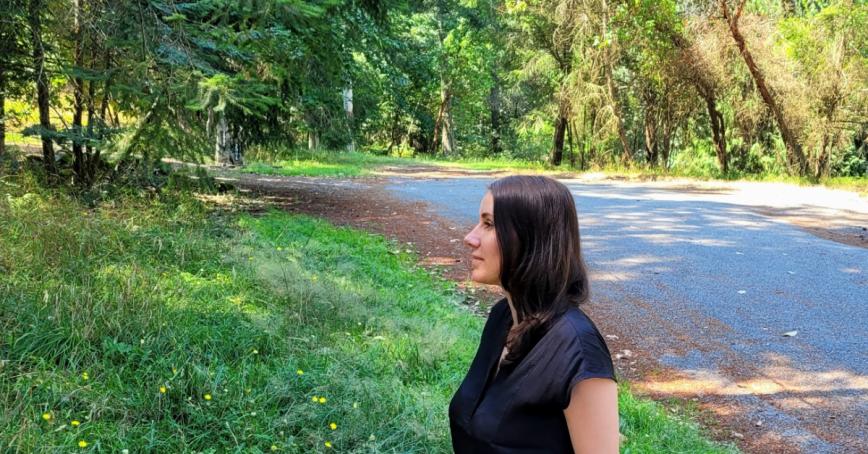Royal Roads researcher aims to help people experiencing pregnancy loss

Rana Van Tuyl was pursuing a doctorate in social sciences with a focus on mental health and psychological safety in schools when a prenatal medical appointment changed both her life and her research.
On December 22, 2020, pregnant about 11 weeks and expecting their first child, the Royal Roads University Doctor of Social Sciences candidate and her partner learned she’d suffered a missed miscarriage (also known as a delayed or silent miscarriage) during their pregnancy ultrasound appointment.
Instead of bringing home their first baby ultrasound photo to share with family and friends over the holidays, Van Tuyl, supported by her partner, needed to decide which treatment option to select—expectant (natural), medical (medication-assisted) or surgical management. Van Tuyl and her partner’s sorrow was then prolonged by medical complications from the miscarriage.
And yet, “Within that challenging journey, I just remember feeling, ‘I’m not allowed to be depressed’ even though I was… Then I finally started talking about it a little bit. And I was just blown away by the number of women, and their partners, who I met who had gone through the same thing.”
Indeed, the Public Health Agency of Canada estimates 15 to 25 per cent of pregnancies end in a miscarriage.
“It just raised a lot of questions, like why is there such a taboo in talking about pregnancy loss?”
A year later, that taboo and her experiences led Van Tuyl to pivot her research to focus on improving access, understanding and dignity during post-miscarriage recovery in BC. There are physical and mental health care needs, as well as issues related to employment standards, with laws governing leave following a pregnancy loss varying between provinces/territories and workplace health benefits differing from employer to employer.
“Some women are going back to work the next day because they feel like they don’t have any other option, and they’re still grieving,” she says. “And there is often even less support for partners who are also grieving.”
The purpose of Van Tuyl’s research is to advance women’s health research on post-miscarriage recovery, access to integrated health care services, and equitable employment standards in BC by identifying both barriers and pathways to patient-centred care. Van Tuyl is inviting people and their partners in BC who’ve experienced pregnancy loss to share their experiences.
“It’s not the same experience for everyone and if there are ways that people have been positively supported through their pregnancy loss and recovery, those are equally important to share.”
Through this patient-oriented, community-based research, she intends to inform patient-centred care and policy development, including putting together a policy brief with the help of research participants to share with health care and employment standards authorities, while acknowledging there’s still much work to be done about the causes of miscarriages.
“All of these things could be explored further in terms of prevention and diagnostic,” she says. “While fetal chromosomal abnormalities are said to account for 50 to 60% of miscarriages, research from Tommy’s National Centre for Miscarriage Research in the United Kingdom highlight other risk factors, such as problems with the endometrium (uterus lining), hormones, blood conditions, previous miscarriages, female age (over 35) and male age (over40), female body mass index (i.e., very low or very high), and DNA sperm damage, to name a few.”
While Van Tuyl acknowledges she and her partner still have hard days with their pregnancy loss, she says a colleague with HIV/AIDS inspires her. “She always says, ‘The good and the bad, I’m going through it so hopefully those who come behind me don’t have to go through it as badly.’
“That’s something that really sunk in when I made the decision that it’s time to do this research. More comprehensive pregnancy loss supports are needed to improve health equity in BC and beyond.”
If you live in BC and have experienced pregnancy loss, and are interested in participating in a conversation for this community-based research project, you can email Van Tuyl at rana.1vantuyl@royalroads.ca.